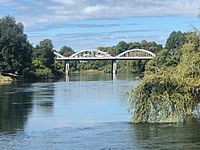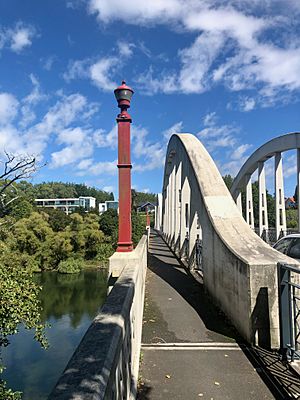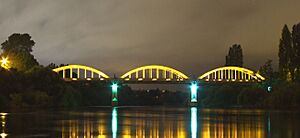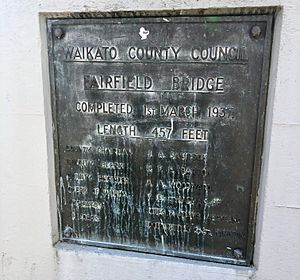Fairfield Bridge facts for kids
Quick facts for kids Fairfield Bridge |
|
|---|---|

Fairfield Bridge from north west
|
|
| Coordinates | 37°46′19″S 175°16′12″E / 37.772°S 175.270°E |
| Carries | Motor vehicles, pedestrians |
| Crosses | Waikato River |
| Locale | Fairfield, Hamilton |
| Preceded by | Whitiora Bridge |
| Followed by | Pukete Bridge |
| Characteristics | |
| Design | Tied-arch |
| Material | Concrete |
| Total length | 139 metres (457 ft) |
| Number of spans | 3 |
| Piers in water | 2 |
| History | |
| Designer | Stanley Jones |
| Constructed by | Roose Shipping |
| Construction begin | 6 August 1934 |
| Opened | 26 April 1937 |
| Statistics | |
| Daily traffic | 20,000 (2002)
19,300 (2012) 18,900 (2015) 18,400 (2018) |
The Fairfield Bridge is a special bridge in Hamilton, New Zealand. It crosses the Waikato River in an area called Fairfield. This bridge is one of six bridges found in the city.
It connects River Road on the east side of the river to Victoria Street on the west side. The bridge is very important because it was named a Category I 'Historic Place' in 1990. This means it's a really important part of New Zealand's history.
The famous Great Race rowing event starts just north of the bridge. Rowers pass right under it during their competition. Long ago, farmers even used the bridge to move their animals across the river.
How the Bridge Was Built

The Fairfield Bridge is 139 metres (about 457 feet) long. It has two sections over land and three main arches. These arches are about 70 centimetres (2.3 feet) wide. They are 40 metres (131 feet) long and reach 7.9 metres (26 feet) above the road.
The road on the bridge is about 6 metres (20 feet) wide. There are also footpaths on the sides, each about 1.5 metres (5 feet) wide. The arches and other parts of the bridge are made from strong reinforced concrete.
Stanley Jones from Auckland designed this impressive bridge. Construction began in August 1934 by Roose Shipping. The bridge officially opened in April 1937. Bob Semple, who was a government minister, opened it to the public.
The Fairfield Bridge was the fourth largest of its kind in New Zealand. It was also the second tied-arch bridge built over the Waikato River.
From Doubt to Daily Use
When the idea of building a bridge in Fairfield first came up, many people didn't think it was needed. At that time, Fairfield was outside the main city area. People thought not many cars would use it.
However, they were wrong! By 2002, about 20,000 vehicles crossed the bridge every single day. This shows how important the bridge became for Hamilton.
Discoveries and Repairs
During the building of the bridge's foundations, workers made an interesting discovery. They found an ancient burial site in the riverbank. This site contained the remains of several Māori.
Later, in 1980, engineers found that the bridge's concrete was getting old and damaged. This problem is sometimes called "concrete cancer." So, in 1991, a big repair project took place. It cost about NZ$1.1 million to fix the bridge.
In January 2011, the bridge had to close for three weeks. This was for more important maintenance work to keep it safe and strong.
Motorcycle Stunt
In 2009, a person named Jonathan Bennett rode a motorcycle on the arches of the Fairfield Bridge. This stunt was filmed and shared online. He was later found responsible for dangerous driving. He received a fine and was not allowed to ride for six months.
 | Laphonza Butler |
 | Daisy Bates |
 | Elizabeth Piper Ensley |



